Analyzing Factors Impacting Career Satisfaction and Commitment
VerifiedAdded on 2021/10/11
|51
|14345
|50
Report
AI Summary
This report provides an introduction to the concept of career satisfaction, exploring its significance for both employees and organizations. It delves into various factors influencing career satisfaction, including job security, organizational support, and employee empowerment, and their impact on organizational commitment. The report highlights the importance of career satisfaction for employee performance, behavior, and turnover intentions. It also discusses the relationship between organizational commitment and career satisfaction. The research objectives aim to analyze the impacts of job security, organizational support, and employee empowerment on organizational commitment and career satisfaction, examining the moderating effect of organizational commitment and the relationship between all variables, especially in the service sector of Pakistan. The report underscores the need for further research on career satisfaction, particularly in the context of Pakistan's service sector.
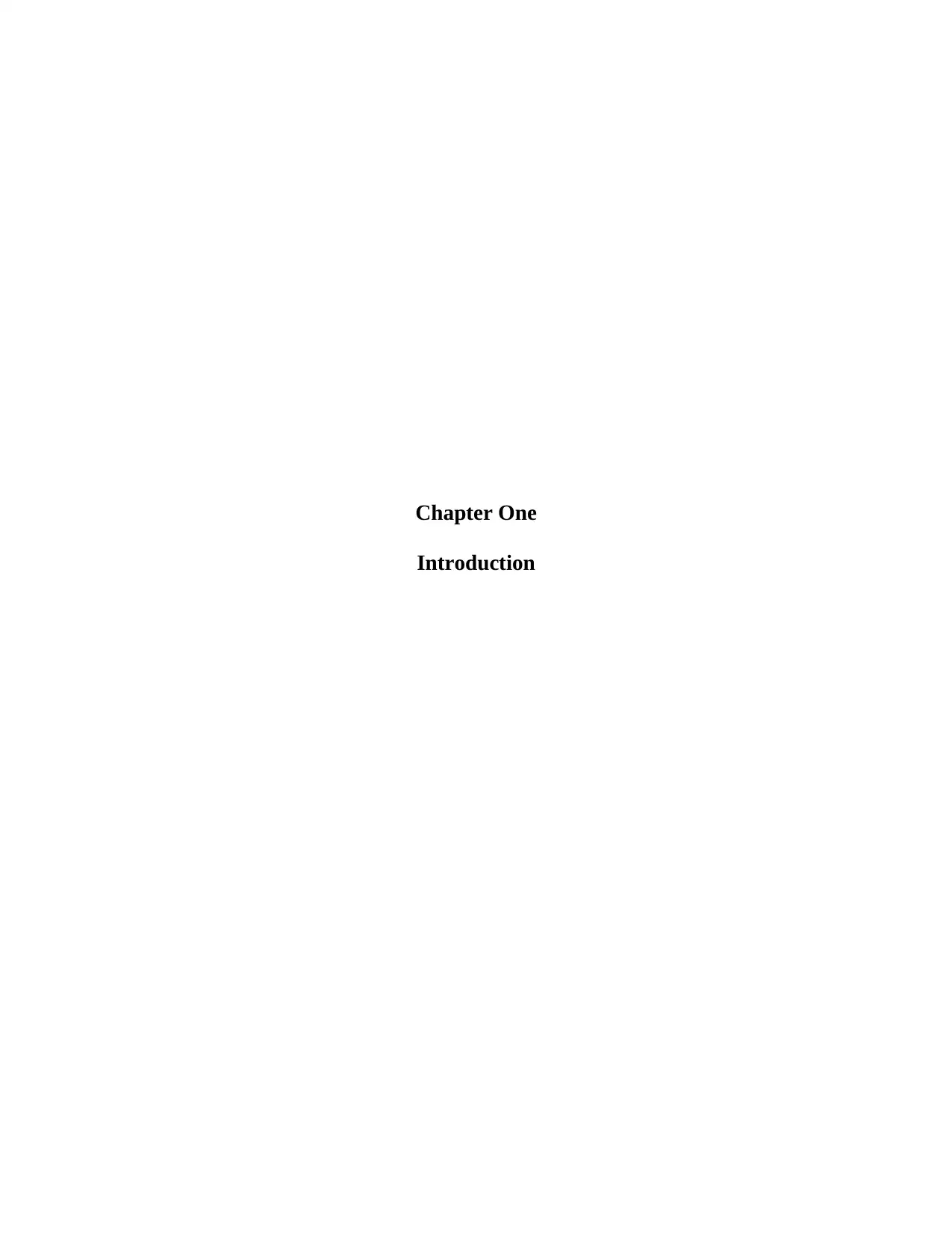
Chapter One
Introduction
Introduction
Paraphrase This Document
Need a fresh take? Get an instant paraphrase of this document with our AI Paraphraser
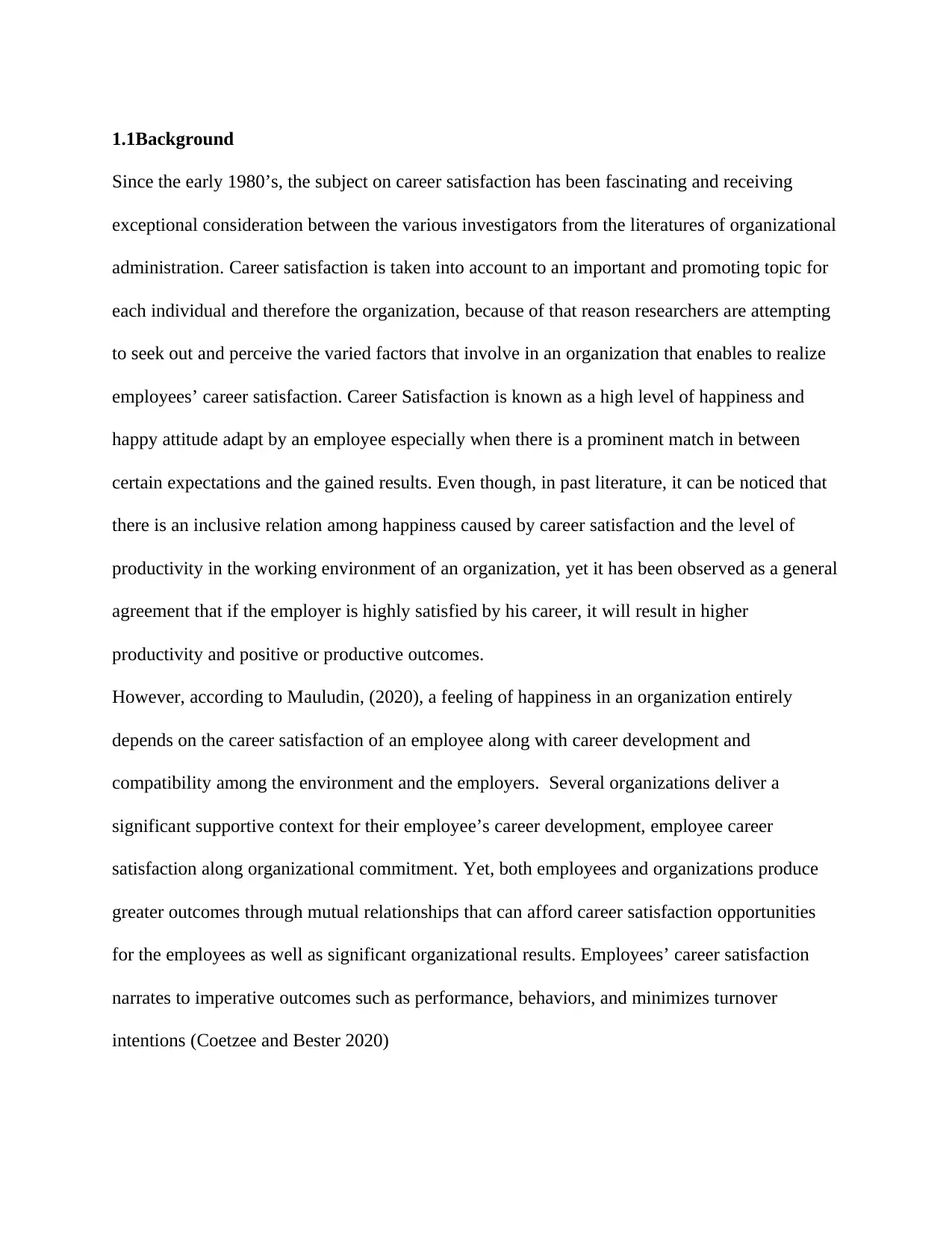
1.1Background
Since the early 1980’s, the subject on career satisfaction has been fascinating and receiving
exceptional consideration between the various investigators from the literatures of organizational
administration. Career satisfaction is taken into account to an important and promoting topic for
each individual and therefore the organization, because of that reason researchers are attempting
to seek out and perceive the varied factors that involve in an organization that enables to realize
employees’ career satisfaction. Career Satisfaction is known as a high level of happiness and
happy attitude adapt by an employee especially when there is a prominent match in between
certain expectations and the gained results. Even though, in past literature, it can be noticed that
there is an inclusive relation among happiness caused by career satisfaction and the level of
productivity in the working environment of an organization, yet it has been observed as a general
agreement that if the employer is highly satisfied by his career, it will result in higher
productivity and positive or productive outcomes.
However, according to Mauludin, (2020), a feeling of happiness in an organization entirely
depends on the career satisfaction of an employee along with career development and
compatibility among the environment and the employers. Several organizations deliver a
significant supportive context for their employee’s career development, employee career
satisfaction along organizational commitment. Yet, both employees and organizations produce
greater outcomes through mutual relationships that can afford career satisfaction opportunities
for the employees as well as significant organizational results. Employees’ career satisfaction
narrates to imperative outcomes such as performance, behaviors, and minimizes turnover
intentions (Coetzee and Bester 2020)
Since the early 1980’s, the subject on career satisfaction has been fascinating and receiving
exceptional consideration between the various investigators from the literatures of organizational
administration. Career satisfaction is taken into account to an important and promoting topic for
each individual and therefore the organization, because of that reason researchers are attempting
to seek out and perceive the varied factors that involve in an organization that enables to realize
employees’ career satisfaction. Career Satisfaction is known as a high level of happiness and
happy attitude adapt by an employee especially when there is a prominent match in between
certain expectations and the gained results. Even though, in past literature, it can be noticed that
there is an inclusive relation among happiness caused by career satisfaction and the level of
productivity in the working environment of an organization, yet it has been observed as a general
agreement that if the employer is highly satisfied by his career, it will result in higher
productivity and positive or productive outcomes.
However, according to Mauludin, (2020), a feeling of happiness in an organization entirely
depends on the career satisfaction of an employee along with career development and
compatibility among the environment and the employers. Several organizations deliver a
significant supportive context for their employee’s career development, employee career
satisfaction along organizational commitment. Yet, both employees and organizations produce
greater outcomes through mutual relationships that can afford career satisfaction opportunities
for the employees as well as significant organizational results. Employees’ career satisfaction
narrates to imperative outcomes such as performance, behaviors, and minimizes turnover
intentions (Coetzee and Bester 2020)
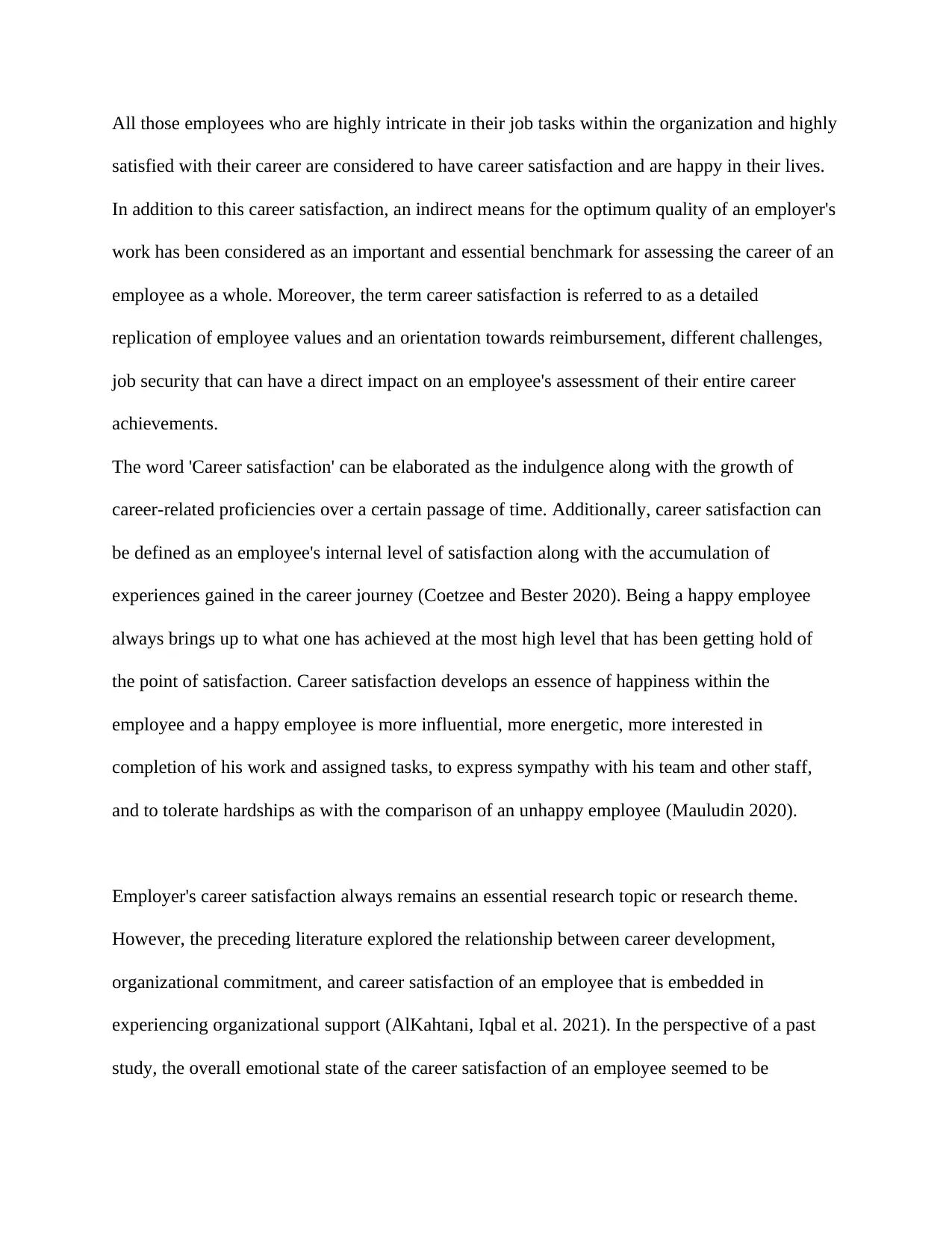
All those employees who are highly intricate in their job tasks within the organization and highly
satisfied with their career are considered to have career satisfaction and are happy in their lives.
In addition to this career satisfaction, an indirect means for the optimum quality of an employer's
work has been considered as an important and essential benchmark for assessing the career of an
employee as a whole. Moreover, the term career satisfaction is referred to as a detailed
replication of employee values and an orientation towards reimbursement, different challenges,
job security that can have a direct impact on an employee's assessment of their entire career
achievements.
The word 'Career satisfaction' can be elaborated as the indulgence along with the growth of
career-related proficiencies over a certain passage of time. Additionally, career satisfaction can
be defined as an employee's internal level of satisfaction along with the accumulation of
experiences gained in the career journey (Coetzee and Bester 2020). Being a happy employee
always brings up to what one has achieved at the most high level that has been getting hold of
the point of satisfaction. Career satisfaction develops an essence of happiness within the
employee and a happy employee is more influential, more energetic, more interested in
completion of his work and assigned tasks, to express sympathy with his team and other staff,
and to tolerate hardships as with the comparison of an unhappy employee (Mauludin 2020).
Employer's career satisfaction always remains an essential research topic or research theme.
However, the preceding literature explored the relationship between career development,
organizational commitment, and career satisfaction of an employee that is embedded in
experiencing organizational support (AlKahtani, Iqbal et al. 2021). In the perspective of a past
study, the overall emotional state of the career satisfaction of an employee seemed to be
satisfied with their career are considered to have career satisfaction and are happy in their lives.
In addition to this career satisfaction, an indirect means for the optimum quality of an employer's
work has been considered as an important and essential benchmark for assessing the career of an
employee as a whole. Moreover, the term career satisfaction is referred to as a detailed
replication of employee values and an orientation towards reimbursement, different challenges,
job security that can have a direct impact on an employee's assessment of their entire career
achievements.
The word 'Career satisfaction' can be elaborated as the indulgence along with the growth of
career-related proficiencies over a certain passage of time. Additionally, career satisfaction can
be defined as an employee's internal level of satisfaction along with the accumulation of
experiences gained in the career journey (Coetzee and Bester 2020). Being a happy employee
always brings up to what one has achieved at the most high level that has been getting hold of
the point of satisfaction. Career satisfaction develops an essence of happiness within the
employee and a happy employee is more influential, more energetic, more interested in
completion of his work and assigned tasks, to express sympathy with his team and other staff,
and to tolerate hardships as with the comparison of an unhappy employee (Mauludin 2020).
Employer's career satisfaction always remains an essential research topic or research theme.
However, the preceding literature explored the relationship between career development,
organizational commitment, and career satisfaction of an employee that is embedded in
experiencing organizational support (AlKahtani, Iqbal et al. 2021). In the perspective of a past
study, the overall emotional state of the career satisfaction of an employee seemed to be
⊘ This is a preview!⊘
Do you want full access?
Subscribe today to unlock all pages.

Trusted by 1+ million students worldwide
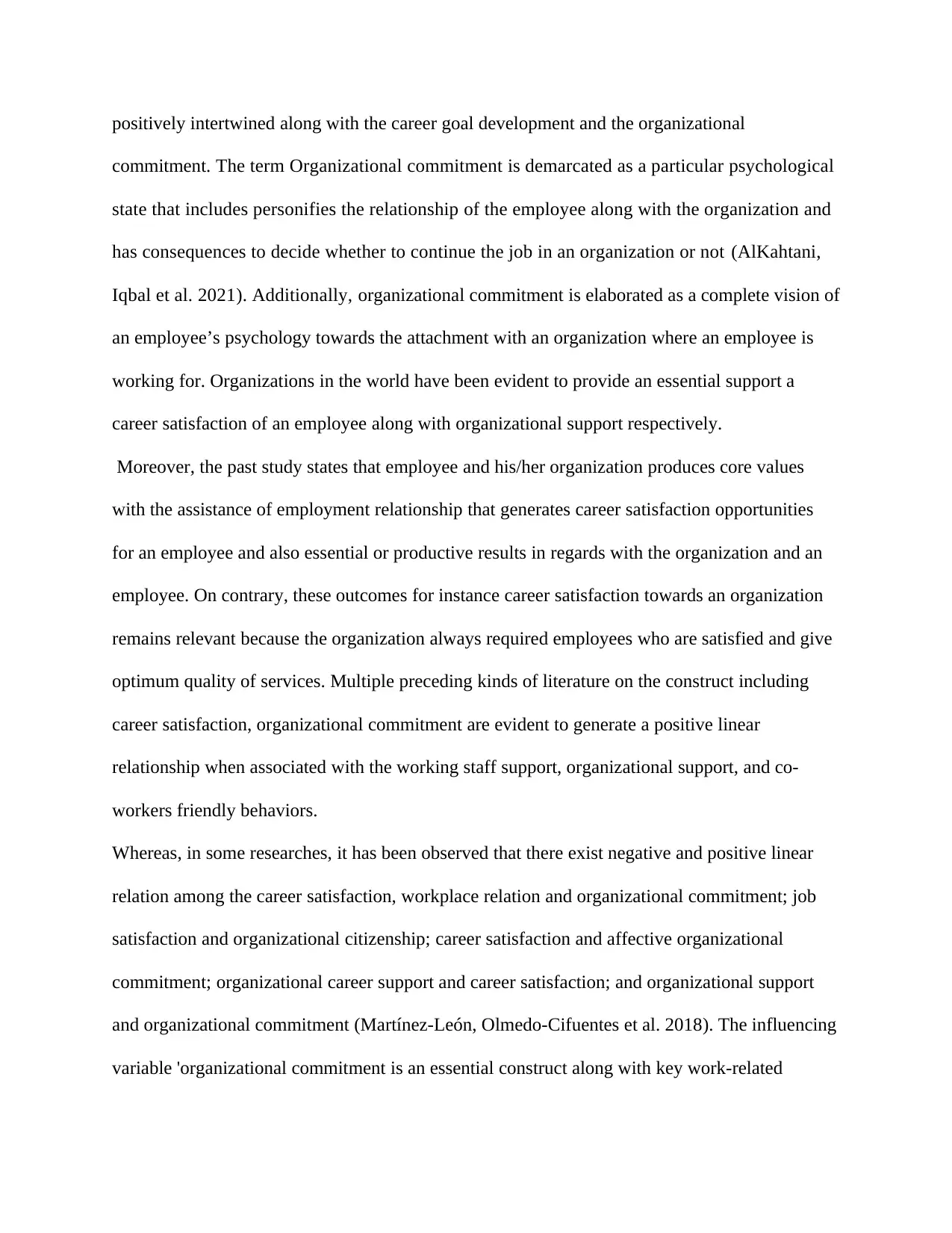
positively intertwined along with the career goal development and the organizational
commitment. The term Organizational commitment is demarcated as a particular psychological
state that includes personifies the relationship of the employee along with the organization and
has consequences to decide whether to continue the job in an organization or not (AlKahtani,
Iqbal et al. 2021). Additionally, organizational commitment is elaborated as a complete vision of
an employee’s psychology towards the attachment with an organization where an employee is
working for. Organizations in the world have been evident to provide an essential support a
career satisfaction of an employee along with organizational support respectively.
Moreover, the past study states that employee and his/her organization produces core values
with the assistance of employment relationship that generates career satisfaction opportunities
for an employee and also essential or productive results in regards with the organization and an
employee. On contrary, these outcomes for instance career satisfaction towards an organization
remains relevant because the organization always required employees who are satisfied and give
optimum quality of services. Multiple preceding kinds of literature on the construct including
career satisfaction, organizational commitment are evident to generate a positive linear
relationship when associated with the working staff support, organizational support, and co-
workers friendly behaviors.
Whereas, in some researches, it has been observed that there exist negative and positive linear
relation among the career satisfaction, workplace relation and organizational commitment; job
satisfaction and organizational citizenship; career satisfaction and affective organizational
commitment; organizational career support and career satisfaction; and organizational support
and organizational commitment (Martínez-León, Olmedo-Cifuentes et al. 2018). The influencing
variable 'organizational commitment is an essential construct along with key work-related
commitment. The term Organizational commitment is demarcated as a particular psychological
state that includes personifies the relationship of the employee along with the organization and
has consequences to decide whether to continue the job in an organization or not (AlKahtani,
Iqbal et al. 2021). Additionally, organizational commitment is elaborated as a complete vision of
an employee’s psychology towards the attachment with an organization where an employee is
working for. Organizations in the world have been evident to provide an essential support a
career satisfaction of an employee along with organizational support respectively.
Moreover, the past study states that employee and his/her organization produces core values
with the assistance of employment relationship that generates career satisfaction opportunities
for an employee and also essential or productive results in regards with the organization and an
employee. On contrary, these outcomes for instance career satisfaction towards an organization
remains relevant because the organization always required employees who are satisfied and give
optimum quality of services. Multiple preceding kinds of literature on the construct including
career satisfaction, organizational commitment are evident to generate a positive linear
relationship when associated with the working staff support, organizational support, and co-
workers friendly behaviors.
Whereas, in some researches, it has been observed that there exist negative and positive linear
relation among the career satisfaction, workplace relation and organizational commitment; job
satisfaction and organizational citizenship; career satisfaction and affective organizational
commitment; organizational career support and career satisfaction; and organizational support
and organizational commitment (Martínez-León, Olmedo-Cifuentes et al. 2018). The influencing
variable 'organizational commitment is an essential construct along with key work-related
Paraphrase This Document
Need a fresh take? Get an instant paraphrase of this document with our AI Paraphraser
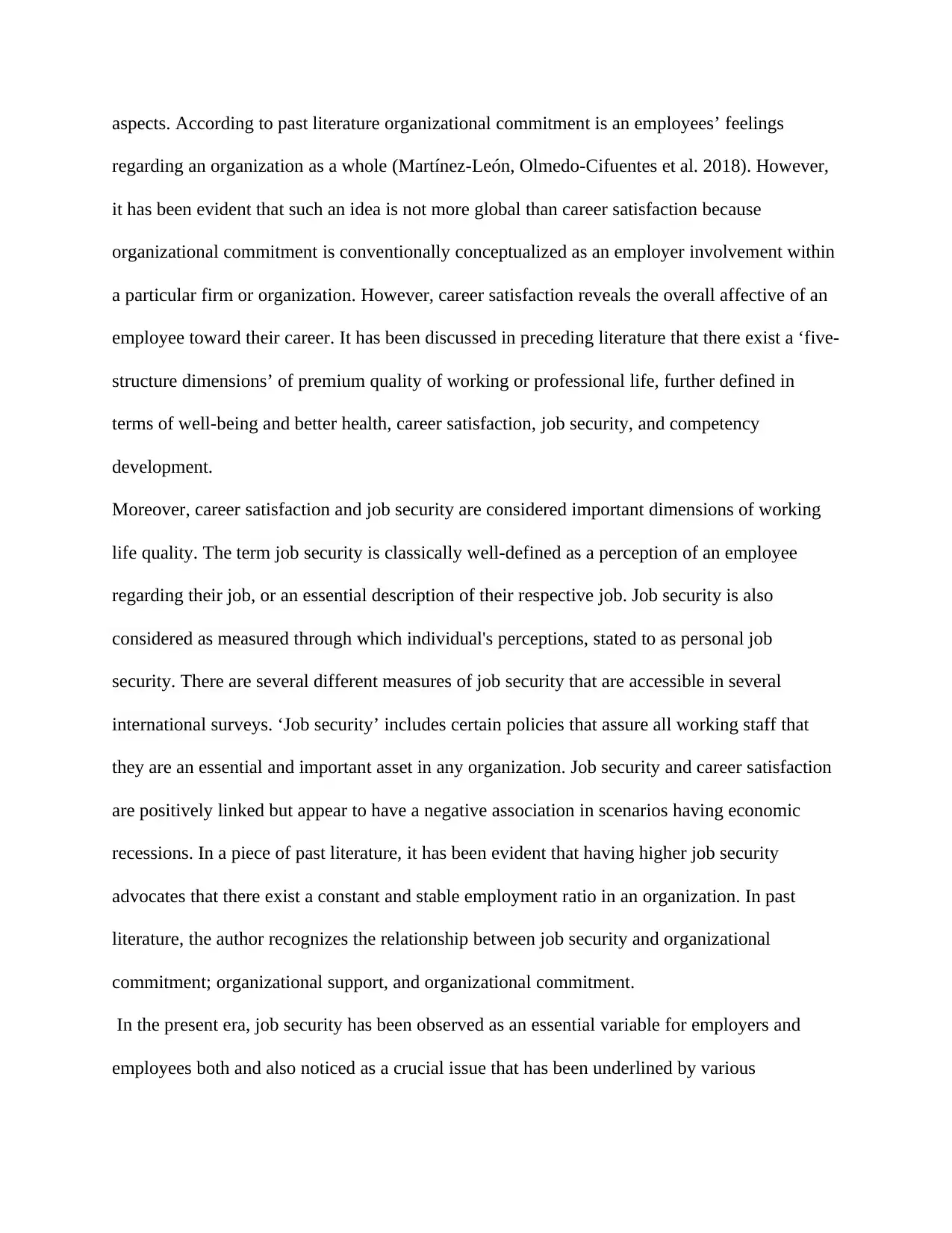
aspects. According to past literature organizational commitment is an employees’ feelings
regarding an organization as a whole (Martínez-León, Olmedo-Cifuentes et al. 2018). However,
it has been evident that such an idea is not more global than career satisfaction because
organizational commitment is conventionally conceptualized as an employer involvement within
a particular firm or organization. However, career satisfaction reveals the overall affective of an
employee toward their career. It has been discussed in preceding literature that there exist a ‘five-
structure dimensions’ of premium quality of working or professional life, further defined in
terms of well-being and better health, career satisfaction, job security, and competency
development.
Moreover, career satisfaction and job security are considered important dimensions of working
life quality. The term job security is classically well-defined as a perception of an employee
regarding their job, or an essential description of their respective job. Job security is also
considered as measured through which individual's perceptions, stated to as personal job
security. There are several different measures of job security that are accessible in several
international surveys. ‘Job security’ includes certain policies that assure all working staff that
they are an essential and important asset in any organization. Job security and career satisfaction
are positively linked but appear to have a negative association in scenarios having economic
recessions. In a piece of past literature, it has been evident that having higher job security
advocates that there exist a constant and stable employment ratio in an organization. In past
literature, the author recognizes the relationship between job security and organizational
commitment; organizational support, and organizational commitment.
In the present era, job security has been observed as an essential variable for employers and
employees both and also noticed as a crucial issue that has been underlined by various
regarding an organization as a whole (Martínez-León, Olmedo-Cifuentes et al. 2018). However,
it has been evident that such an idea is not more global than career satisfaction because
organizational commitment is conventionally conceptualized as an employer involvement within
a particular firm or organization. However, career satisfaction reveals the overall affective of an
employee toward their career. It has been discussed in preceding literature that there exist a ‘five-
structure dimensions’ of premium quality of working or professional life, further defined in
terms of well-being and better health, career satisfaction, job security, and competency
development.
Moreover, career satisfaction and job security are considered important dimensions of working
life quality. The term job security is classically well-defined as a perception of an employee
regarding their job, or an essential description of their respective job. Job security is also
considered as measured through which individual's perceptions, stated to as personal job
security. There are several different measures of job security that are accessible in several
international surveys. ‘Job security’ includes certain policies that assure all working staff that
they are an essential and important asset in any organization. Job security and career satisfaction
are positively linked but appear to have a negative association in scenarios having economic
recessions. In a piece of past literature, it has been evident that having higher job security
advocates that there exist a constant and stable employment ratio in an organization. In past
literature, the author recognizes the relationship between job security and organizational
commitment; organizational support, and organizational commitment.
In the present era, job security has been observed as an essential variable for employers and
employees both and also noticed as a crucial issue that has been underlined by various
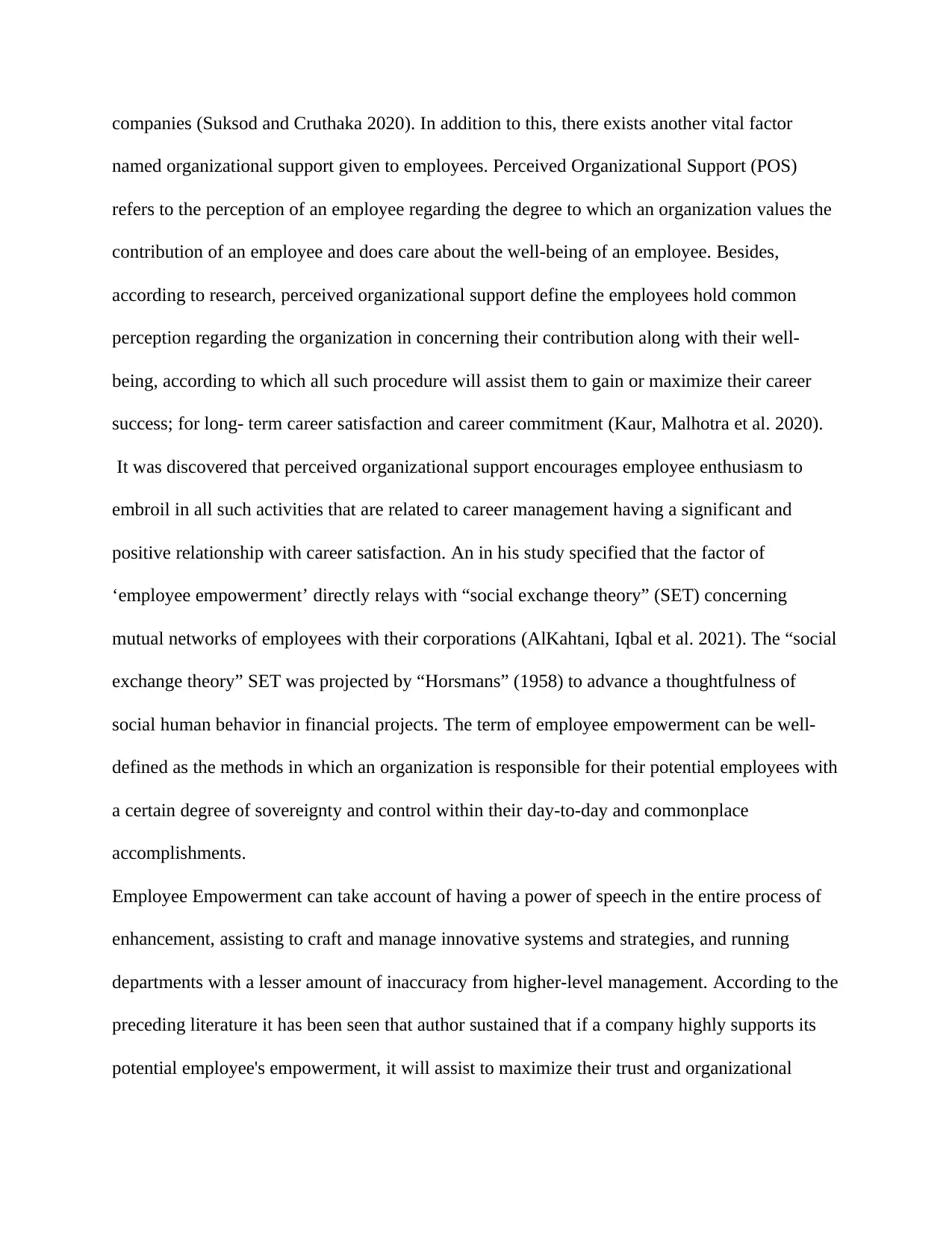
companies (Suksod and Cruthaka 2020). In addition to this, there exists another vital factor
named organizational support given to employees. Perceived Organizational Support (POS)
refers to the perception of an employee regarding the degree to which an organization values the
contribution of an employee and does care about the well-being of an employee. Besides,
according to research, perceived organizational support define the employees hold common
perception regarding the organization in concerning their contribution along with their well-
being, according to which all such procedure will assist them to gain or maximize their career
success; for long- term career satisfaction and career commitment (Kaur, Malhotra et al. 2020).
It was discovered that perceived organizational support encourages employee enthusiasm to
embroil in all such activities that are related to career management having a significant and
positive relationship with career satisfaction. An in his study specified that the factor of
‘employee empowerment’ directly relays with “social exchange theory” (SET) concerning
mutual networks of employees with their corporations (AlKahtani, Iqbal et al. 2021). The “social
exchange theory” SET was projected by “Horsmans” (1958) to advance a thoughtfulness of
social human behavior in financial projects. The term of employee empowerment can be well-
defined as the methods in which an organization is responsible for their potential employees with
a certain degree of sovereignty and control within their day-to-day and commonplace
accomplishments.
Employee Empowerment can take account of having a power of speech in the entire process of
enhancement, assisting to craft and manage innovative systems and strategies, and running
departments with a lesser amount of inaccuracy from higher-level management. According to the
preceding literature it has been seen that author sustained that if a company highly supports its
potential employee's empowerment, it will assist to maximize their trust and organizational
named organizational support given to employees. Perceived Organizational Support (POS)
refers to the perception of an employee regarding the degree to which an organization values the
contribution of an employee and does care about the well-being of an employee. Besides,
according to research, perceived organizational support define the employees hold common
perception regarding the organization in concerning their contribution along with their well-
being, according to which all such procedure will assist them to gain or maximize their career
success; for long- term career satisfaction and career commitment (Kaur, Malhotra et al. 2020).
It was discovered that perceived organizational support encourages employee enthusiasm to
embroil in all such activities that are related to career management having a significant and
positive relationship with career satisfaction. An in his study specified that the factor of
‘employee empowerment’ directly relays with “social exchange theory” (SET) concerning
mutual networks of employees with their corporations (AlKahtani, Iqbal et al. 2021). The “social
exchange theory” SET was projected by “Horsmans” (1958) to advance a thoughtfulness of
social human behavior in financial projects. The term of employee empowerment can be well-
defined as the methods in which an organization is responsible for their potential employees with
a certain degree of sovereignty and control within their day-to-day and commonplace
accomplishments.
Employee Empowerment can take account of having a power of speech in the entire process of
enhancement, assisting to craft and manage innovative systems and strategies, and running
departments with a lesser amount of inaccuracy from higher-level management. According to the
preceding literature it has been seen that author sustained that if a company highly supports its
potential employee's empowerment, it will assist to maximize their trust and organizational
⊘ This is a preview!⊘
Do you want full access?
Subscribe today to unlock all pages.

Trusted by 1+ million students worldwide
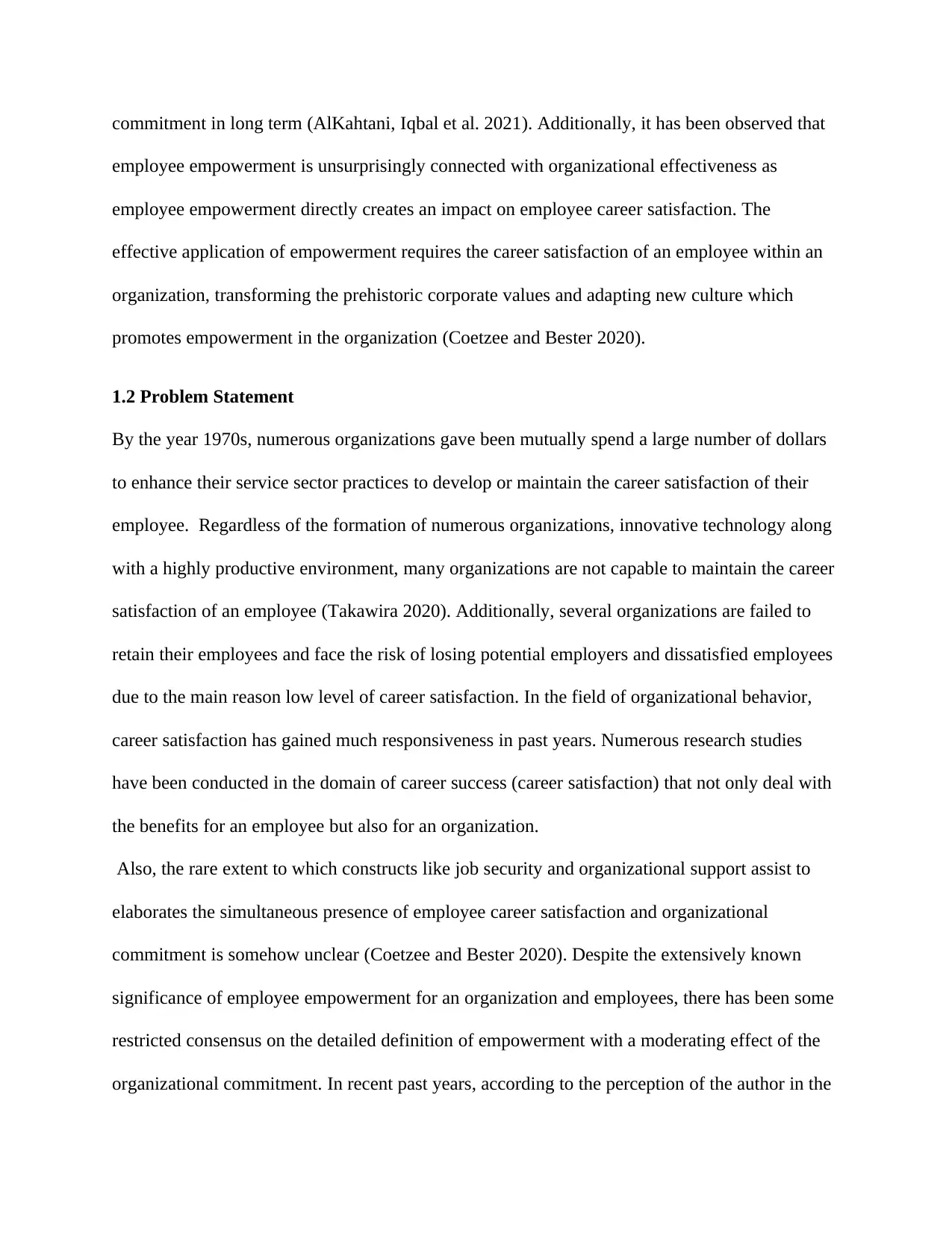
commitment in long term (AlKahtani, Iqbal et al. 2021). Additionally, it has been observed that
employee empowerment is unsurprisingly connected with organizational effectiveness as
employee empowerment directly creates an impact on employee career satisfaction. The
effective application of empowerment requires the career satisfaction of an employee within an
organization, transforming the prehistoric corporate values and adapting new culture which
promotes empowerment in the organization (Coetzee and Bester 2020).
1.2 Problem Statement
By the year 1970s, numerous organizations gave been mutually spend a large number of dollars
to enhance their service sector practices to develop or maintain the career satisfaction of their
employee. Regardless of the formation of numerous organizations, innovative technology along
with a highly productive environment, many organizations are not capable to maintain the career
satisfaction of an employee (Takawira 2020). Additionally, several organizations are failed to
retain their employees and face the risk of losing potential employers and dissatisfied employees
due to the main reason low level of career satisfaction. In the field of organizational behavior,
career satisfaction has gained much responsiveness in past years. Numerous research studies
have been conducted in the domain of career success (career satisfaction) that not only deal with
the benefits for an employee but also for an organization.
Also, the rare extent to which constructs like job security and organizational support assist to
elaborates the simultaneous presence of employee career satisfaction and organizational
commitment is somehow unclear (Coetzee and Bester 2020). Despite the extensively known
significance of employee empowerment for an organization and employees, there has been some
restricted consensus on the detailed definition of empowerment with a moderating effect of the
organizational commitment. In recent past years, according to the perception of the author in the
employee empowerment is unsurprisingly connected with organizational effectiveness as
employee empowerment directly creates an impact on employee career satisfaction. The
effective application of empowerment requires the career satisfaction of an employee within an
organization, transforming the prehistoric corporate values and adapting new culture which
promotes empowerment in the organization (Coetzee and Bester 2020).
1.2 Problem Statement
By the year 1970s, numerous organizations gave been mutually spend a large number of dollars
to enhance their service sector practices to develop or maintain the career satisfaction of their
employee. Regardless of the formation of numerous organizations, innovative technology along
with a highly productive environment, many organizations are not capable to maintain the career
satisfaction of an employee (Takawira 2020). Additionally, several organizations are failed to
retain their employees and face the risk of losing potential employers and dissatisfied employees
due to the main reason low level of career satisfaction. In the field of organizational behavior,
career satisfaction has gained much responsiveness in past years. Numerous research studies
have been conducted in the domain of career success (career satisfaction) that not only deal with
the benefits for an employee but also for an organization.
Also, the rare extent to which constructs like job security and organizational support assist to
elaborates the simultaneous presence of employee career satisfaction and organizational
commitment is somehow unclear (Coetzee and Bester 2020). Despite the extensively known
significance of employee empowerment for an organization and employees, there has been some
restricted consensus on the detailed definition of empowerment with a moderating effect of the
organizational commitment. In recent past years, according to the perception of the author in the
Paraphrase This Document
Need a fresh take? Get an instant paraphrase of this document with our AI Paraphraser
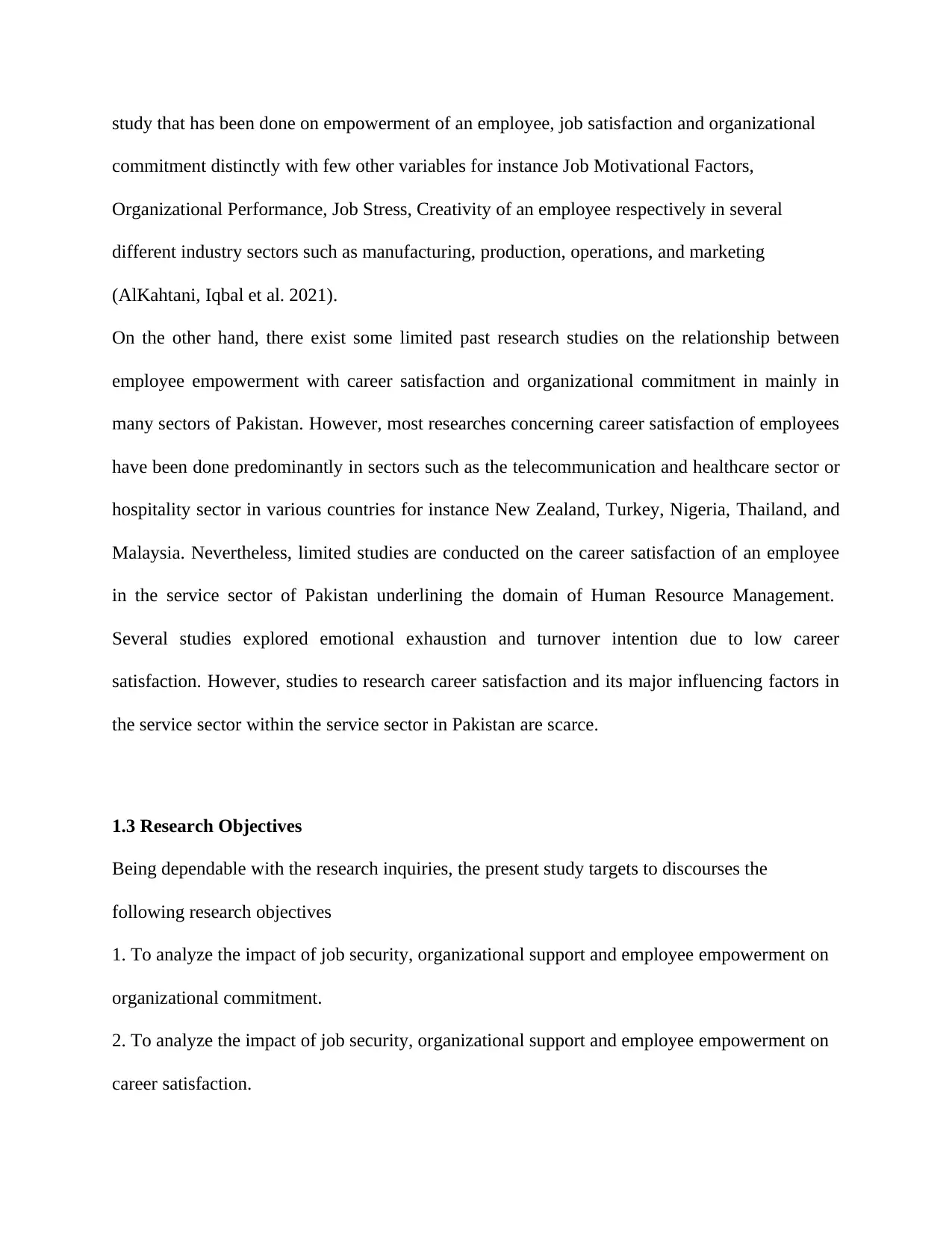
study that has been done on empowerment of an employee, job satisfaction and organizational
commitment distinctly with few other variables for instance Job Motivational Factors,
Organizational Performance, Job Stress, Creativity of an employee respectively in several
different industry sectors such as manufacturing, production, operations, and marketing
(AlKahtani, Iqbal et al. 2021).
On the other hand, there exist some limited past research studies on the relationship between
employee empowerment with career satisfaction and organizational commitment in mainly in
many sectors of Pakistan. However, most researches concerning career satisfaction of employees
have been done predominantly in sectors such as the telecommunication and healthcare sector or
hospitality sector in various countries for instance New Zealand, Turkey, Nigeria, Thailand, and
Malaysia. Nevertheless, limited studies are conducted on the career satisfaction of an employee
in the service sector of Pakistan underlining the domain of Human Resource Management.
Several studies explored emotional exhaustion and turnover intention due to low career
satisfaction. However, studies to research career satisfaction and its major influencing factors in
the service sector within the service sector in Pakistan are scarce.
1.3 Research Objectives
Being dependable with the research inquiries, the present study targets to discourses the
following research objectives
1. To analyze the impact of job security, organizational support and employee empowerment on
organizational commitment.
2. To analyze the impact of job security, organizational support and employee empowerment on
career satisfaction.
commitment distinctly with few other variables for instance Job Motivational Factors,
Organizational Performance, Job Stress, Creativity of an employee respectively in several
different industry sectors such as manufacturing, production, operations, and marketing
(AlKahtani, Iqbal et al. 2021).
On the other hand, there exist some limited past research studies on the relationship between
employee empowerment with career satisfaction and organizational commitment in mainly in
many sectors of Pakistan. However, most researches concerning career satisfaction of employees
have been done predominantly in sectors such as the telecommunication and healthcare sector or
hospitality sector in various countries for instance New Zealand, Turkey, Nigeria, Thailand, and
Malaysia. Nevertheless, limited studies are conducted on the career satisfaction of an employee
in the service sector of Pakistan underlining the domain of Human Resource Management.
Several studies explored emotional exhaustion and turnover intention due to low career
satisfaction. However, studies to research career satisfaction and its major influencing factors in
the service sector within the service sector in Pakistan are scarce.
1.3 Research Objectives
Being dependable with the research inquiries, the present study targets to discourses the
following research objectives
1. To analyze the impact of job security, organizational support and employee empowerment on
organizational commitment.
2. To analyze the impact of job security, organizational support and employee empowerment on
career satisfaction.
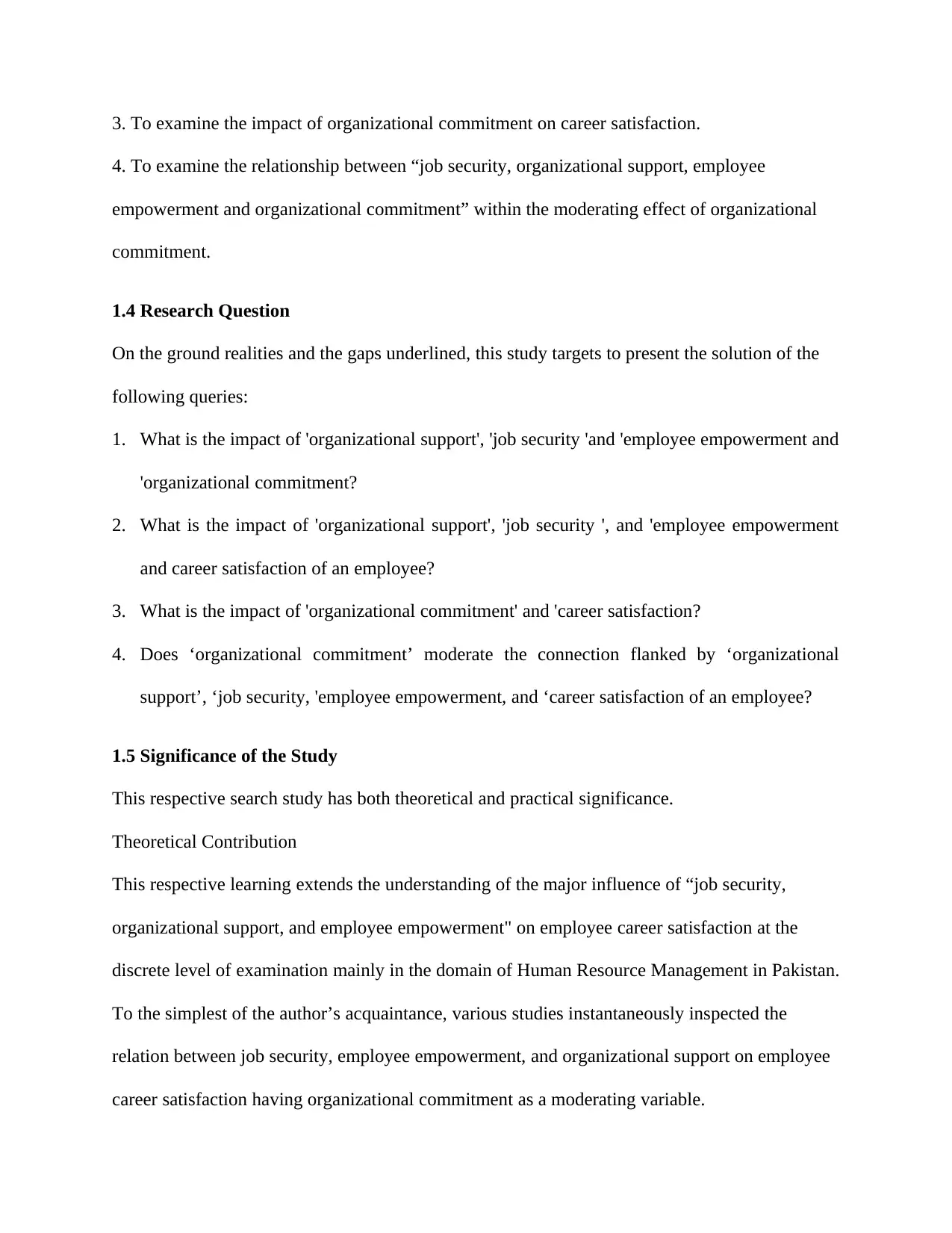
3. To examine the impact of organizational commitment on career satisfaction.
4. To examine the relationship between “job security, organizational support, employee
empowerment and organizational commitment” within the moderating effect of organizational
commitment.
1.4 Research Question
On the ground realities and the gaps underlined, this study targets to present the solution of the
following queries:
1. What is the impact of 'organizational support', 'job security 'and 'employee empowerment and
'organizational commitment?
2. What is the impact of 'organizational support', 'job security ', and 'employee empowerment
and career satisfaction of an employee?
3. What is the impact of 'organizational commitment' and 'career satisfaction?
4. Does ‘organizational commitment’ moderate the connection flanked by ‘organizational
support’, ‘job security, 'employee empowerment, and ‘career satisfaction of an employee?
1.5 Significance of the Study
This respective search study has both theoretical and practical significance.
Theoretical Contribution
This respective learning extends the understanding of the major influence of “job security,
organizational support, and employee empowerment" on employee career satisfaction at the
discrete level of examination mainly in the domain of Human Resource Management in Pakistan.
To the simplest of the author’s acquaintance, various studies instantaneously inspected the
relation between job security, employee empowerment, and organizational support on employee
career satisfaction having organizational commitment as a moderating variable.
4. To examine the relationship between “job security, organizational support, employee
empowerment and organizational commitment” within the moderating effect of organizational
commitment.
1.4 Research Question
On the ground realities and the gaps underlined, this study targets to present the solution of the
following queries:
1. What is the impact of 'organizational support', 'job security 'and 'employee empowerment and
'organizational commitment?
2. What is the impact of 'organizational support', 'job security ', and 'employee empowerment
and career satisfaction of an employee?
3. What is the impact of 'organizational commitment' and 'career satisfaction?
4. Does ‘organizational commitment’ moderate the connection flanked by ‘organizational
support’, ‘job security, 'employee empowerment, and ‘career satisfaction of an employee?
1.5 Significance of the Study
This respective search study has both theoretical and practical significance.
Theoretical Contribution
This respective learning extends the understanding of the major influence of “job security,
organizational support, and employee empowerment" on employee career satisfaction at the
discrete level of examination mainly in the domain of Human Resource Management in Pakistan.
To the simplest of the author’s acquaintance, various studies instantaneously inspected the
relation between job security, employee empowerment, and organizational support on employee
career satisfaction having organizational commitment as a moderating variable.
⊘ This is a preview!⊘
Do you want full access?
Subscribe today to unlock all pages.

Trusted by 1+ million students worldwide
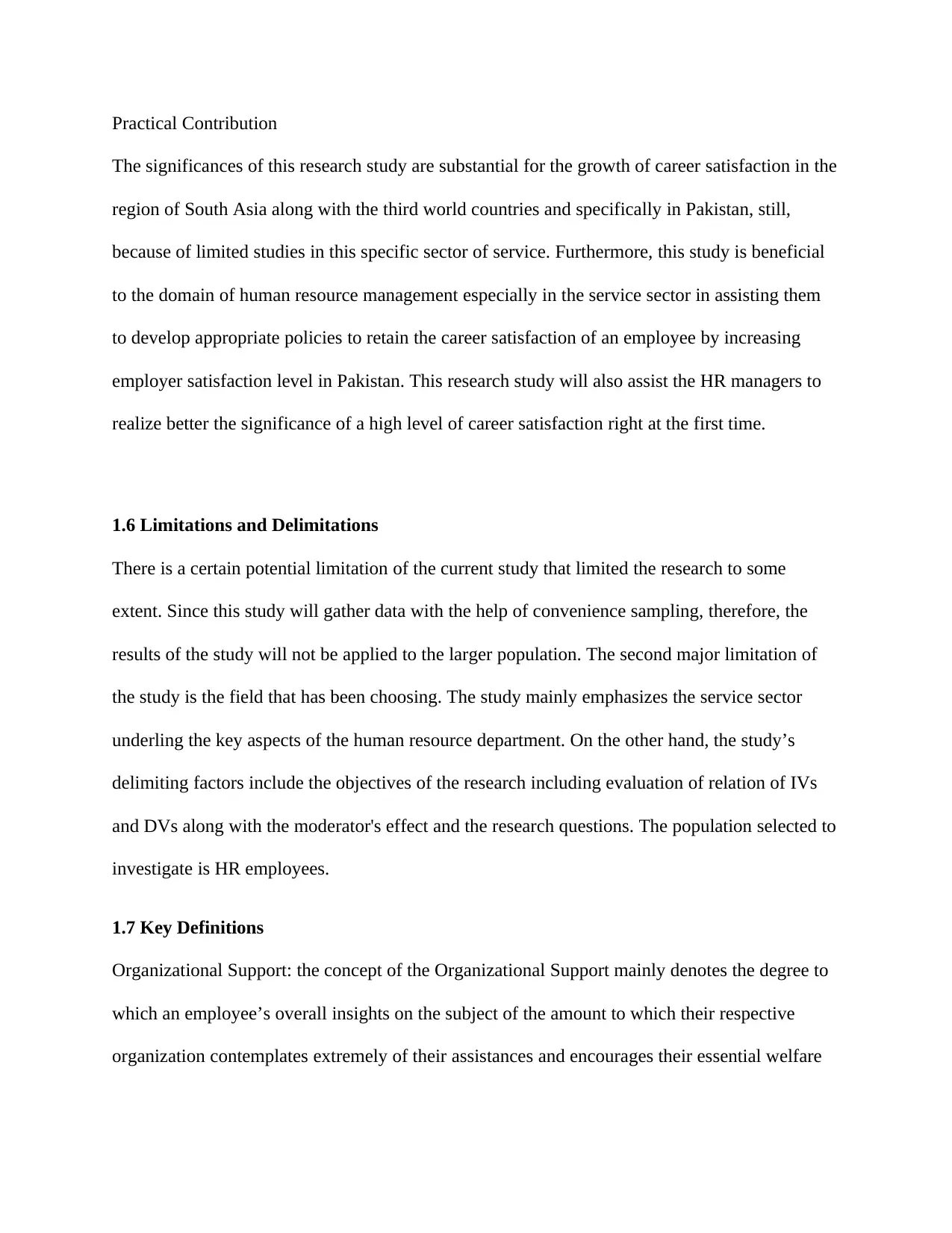
Practical Contribution
The significances of this research study are substantial for the growth of career satisfaction in the
region of South Asia along with the third world countries and specifically in Pakistan, still,
because of limited studies in this specific sector of service. Furthermore, this study is beneficial
to the domain of human resource management especially in the service sector in assisting them
to develop appropriate policies to retain the career satisfaction of an employee by increasing
employer satisfaction level in Pakistan. This research study will also assist the HR managers to
realize better the significance of a high level of career satisfaction right at the first time.
1.6 Limitations and Delimitations
There is a certain potential limitation of the current study that limited the research to some
extent. Since this study will gather data with the help of convenience sampling, therefore, the
results of the study will not be applied to the larger population. The second major limitation of
the study is the field that has been choosing. The study mainly emphasizes the service sector
underling the key aspects of the human resource department. On the other hand, the study’s
delimiting factors include the objectives of the research including evaluation of relation of IVs
and DVs along with the moderator's effect and the research questions. The population selected to
investigate is HR employees.
1.7 Key Definitions
Organizational Support: the concept of the Organizational Support mainly denotes the degree to
which an employee’s overall insights on the subject of the amount to which their respective
organization contemplates extremely of their assistances and encourages their essential welfare
The significances of this research study are substantial for the growth of career satisfaction in the
region of South Asia along with the third world countries and specifically in Pakistan, still,
because of limited studies in this specific sector of service. Furthermore, this study is beneficial
to the domain of human resource management especially in the service sector in assisting them
to develop appropriate policies to retain the career satisfaction of an employee by increasing
employer satisfaction level in Pakistan. This research study will also assist the HR managers to
realize better the significance of a high level of career satisfaction right at the first time.
1.6 Limitations and Delimitations
There is a certain potential limitation of the current study that limited the research to some
extent. Since this study will gather data with the help of convenience sampling, therefore, the
results of the study will not be applied to the larger population. The second major limitation of
the study is the field that has been choosing. The study mainly emphasizes the service sector
underling the key aspects of the human resource department. On the other hand, the study’s
delimiting factors include the objectives of the research including evaluation of relation of IVs
and DVs along with the moderator's effect and the research questions. The population selected to
investigate is HR employees.
1.7 Key Definitions
Organizational Support: the concept of the Organizational Support mainly denotes the degree to
which an employee’s overall insights on the subject of the amount to which their respective
organization contemplates extremely of their assistances and encourages their essential welfare
Paraphrase This Document
Need a fresh take? Get an instant paraphrase of this document with our AI Paraphraser
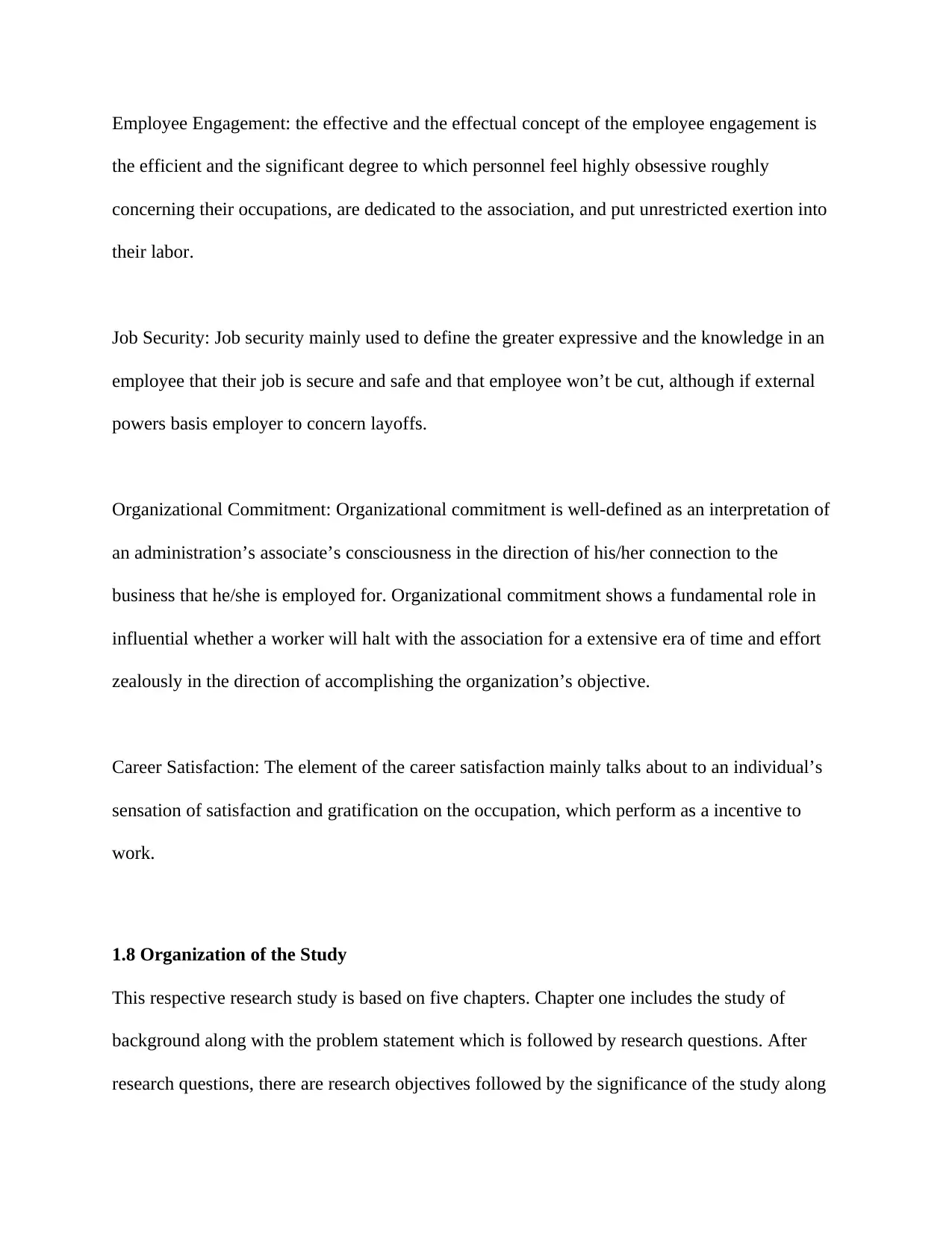
Employee Engagement: the effective and the effectual concept of the employee engagement is
the efficient and the significant degree to which personnel feel highly obsessive roughly
concerning their occupations, are dedicated to the association, and put unrestricted exertion into
their labor.
Job Security: Job security mainly used to define the greater expressive and the knowledge in an
employee that their job is secure and safe and that employee won’t be cut, although if external
powers basis employer to concern layoffs.
Organizational Commitment: Organizational commitment is well-defined as an interpretation of
an administration’s associate’s consciousness in the direction of his/her connection to the
business that he/she is employed for. Organizational commitment shows a fundamental role in
influential whether a worker will halt with the association for a extensive era of time and effort
zealously in the direction of accomplishing the organization’s objective.
Career Satisfaction: The element of the career satisfaction mainly talks about to an individual’s
sensation of satisfaction and gratification on the occupation, which perform as a incentive to
work.
1.8 Organization of the Study
This respective research study is based on five chapters. Chapter one includes the study of
background along with the problem statement which is followed by research questions. After
research questions, there are research objectives followed by the significance of the study along
the efficient and the significant degree to which personnel feel highly obsessive roughly
concerning their occupations, are dedicated to the association, and put unrestricted exertion into
their labor.
Job Security: Job security mainly used to define the greater expressive and the knowledge in an
employee that their job is secure and safe and that employee won’t be cut, although if external
powers basis employer to concern layoffs.
Organizational Commitment: Organizational commitment is well-defined as an interpretation of
an administration’s associate’s consciousness in the direction of his/her connection to the
business that he/she is employed for. Organizational commitment shows a fundamental role in
influential whether a worker will halt with the association for a extensive era of time and effort
zealously in the direction of accomplishing the organization’s objective.
Career Satisfaction: The element of the career satisfaction mainly talks about to an individual’s
sensation of satisfaction and gratification on the occupation, which perform as a incentive to
work.
1.8 Organization of the Study
This respective research study is based on five chapters. Chapter one includes the study of
background along with the problem statement which is followed by research questions. After
research questions, there are research objectives followed by the significance of the study along
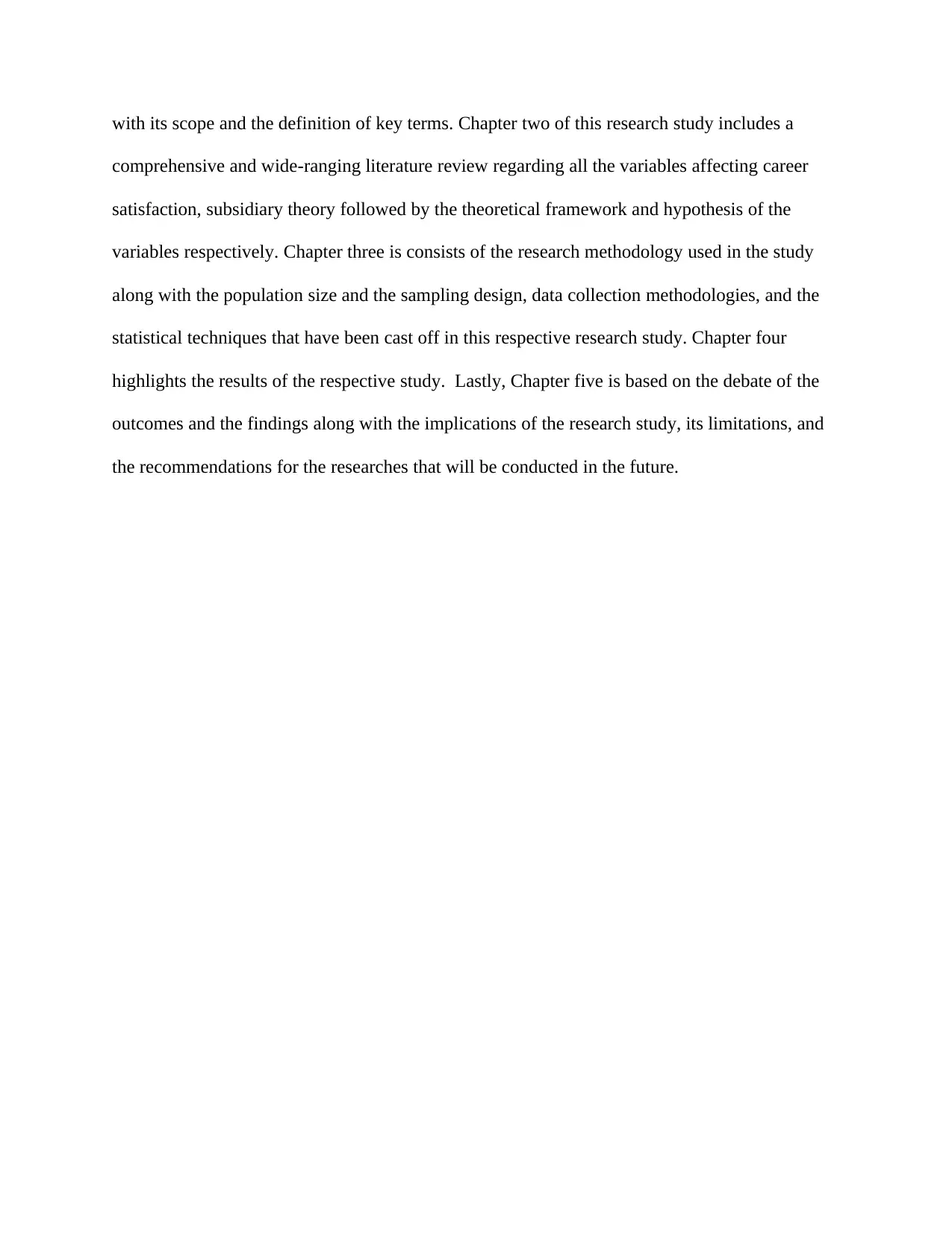
with its scope and the definition of key terms. Chapter two of this research study includes a
comprehensive and wide-ranging literature review regarding all the variables affecting career
satisfaction, subsidiary theory followed by the theoretical framework and hypothesis of the
variables respectively. Chapter three is consists of the research methodology used in the study
along with the population size and the sampling design, data collection methodologies, and the
statistical techniques that have been cast off in this respective research study. Chapter four
highlights the results of the respective study. Lastly, Chapter five is based on the debate of the
outcomes and the findings along with the implications of the research study, its limitations, and
the recommendations for the researches that will be conducted in the future.
comprehensive and wide-ranging literature review regarding all the variables affecting career
satisfaction, subsidiary theory followed by the theoretical framework and hypothesis of the
variables respectively. Chapter three is consists of the research methodology used in the study
along with the population size and the sampling design, data collection methodologies, and the
statistical techniques that have been cast off in this respective research study. Chapter four
highlights the results of the respective study. Lastly, Chapter five is based on the debate of the
outcomes and the findings along with the implications of the research study, its limitations, and
the recommendations for the researches that will be conducted in the future.
⊘ This is a preview!⊘
Do you want full access?
Subscribe today to unlock all pages.

Trusted by 1+ million students worldwide
1 out of 51
Related Documents
Your All-in-One AI-Powered Toolkit for Academic Success.
+13062052269
info@desklib.com
Available 24*7 on WhatsApp / Email
![[object Object]](/_next/static/media/star-bottom.7253800d.svg)
Unlock your academic potential
Copyright © 2020–2026 A2Z Services. All Rights Reserved. Developed and managed by ZUCOL.





